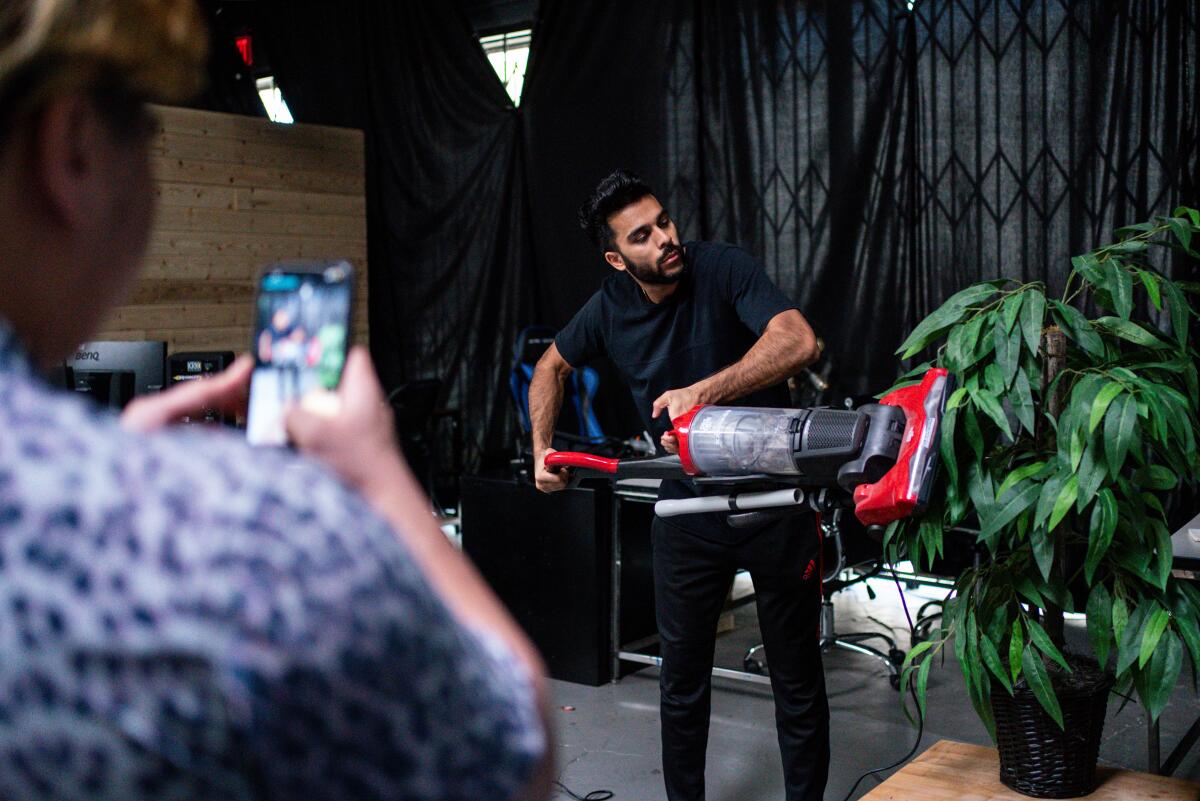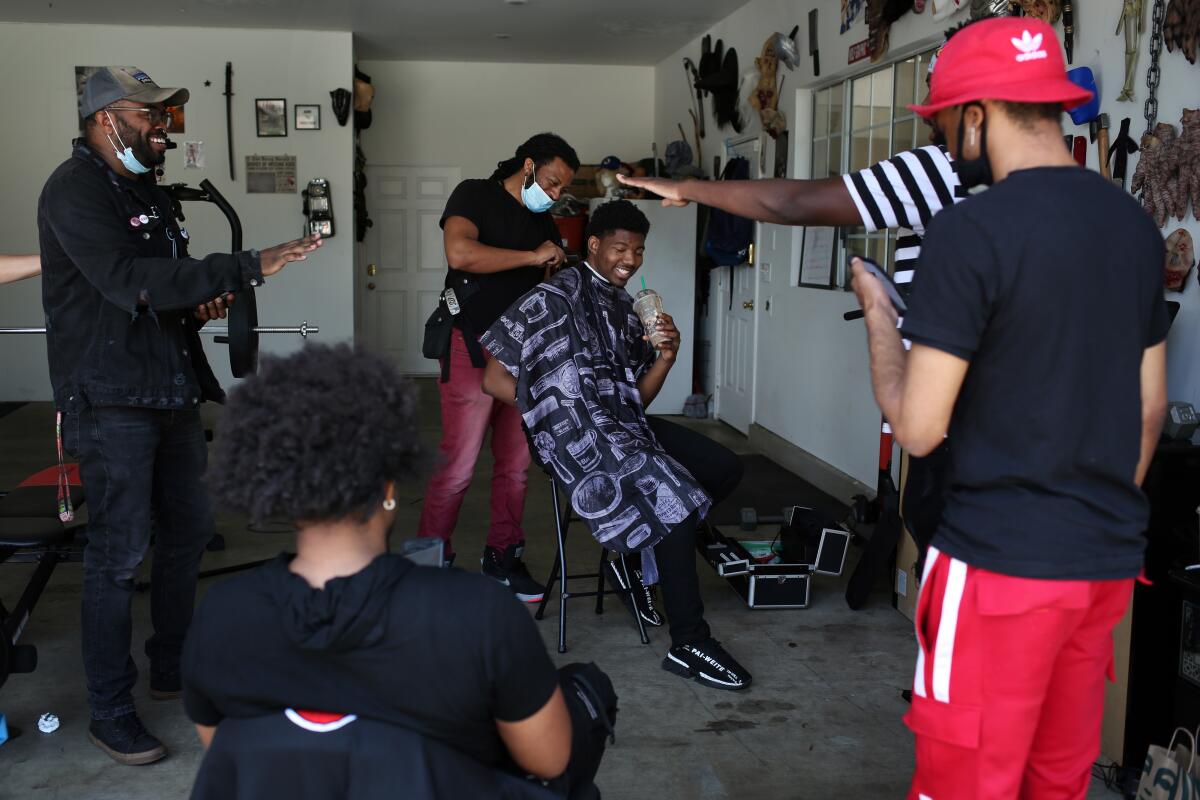Amid the coronavirus lockdown, TikTok gives hope to L.A. entertainers

- Share via
Adam Waheed struggled to make it as a comedian soon after he moved to Los Angeles from Texas three years ago, never quite succeeding on the stand-up circuit.
But the New York native, 27, is now making millions of dollars through social media, with 5.2 million followers on the video-sharing app TikTok.
Waheed’s fast-paced, highly edited slapstick videos — one featured what it feels like to have sweaty armpits on a date and involved a fire hose of water spray — have become gold. He’s landed major brand deals with companies like Pepsi and starred in a Comedy Central show.
“All these doors started opening from all my videos on TikTok,” Waheed said. “Honestly, it’s been amazing.”
Such optimism sounds jarring at a time when many performers have suddenly lost their livelihoods due to the coronavirus outbreak. But some creators who rely on TikTok for income are seeing an increased appetite for their videos amid a surge in demand for home entertainment viewing.
In fact, TikTok broke a record for the most app downloads in a single quarter in the first three months of 2020, according to data from San Francisco app market research firm Sensor Tower. Overall, TikTok logged more than 315 million installs in the first quarter of 2020, up 58% from the previous quarter, Sensor Tower said.
@adamw When u have sweaty armpits 😂 @theevelyngonzalez @directedbystro ##comedy ##foryou
♬ original sound - adamw
“Our user numbers, our engagement numbers, time spent in the app — across the board, our metrics are up,” said Vanessa Pappas, TikTok U.S. general manager. Pappas chalks it up to people wanting some “relief” and “connectivity” during troubled times.
The social video sharing platform owned by Beijing-based tech firm ByteDance, is continuing to expand, including in Los Angeles. The company, which employs more than 400 people in the U.S., is hiring staff to work in its new U.S. headquarters in Culver City. The 120,000-square-foot facility, which opened in January, has a capacity to house 1,000 people. This fall it will add a studio for creators and partners to collaborate on projects.
Where can Hollywood’s cast and crew find work during the coronavirus crisis?
The space illustrates the whimsy and boldness of TikTok’s quirky culture, with walls decorated with bright rainbows and a hot pink staircase running through its five floors.
“For us, L.A. has always been the creative home and certainly matches our brand in terms [of] being at that intersection of creativity and technology, so it just made sense for us to expand our office there,” Pappas said.
TikTok, which evolved out of a lip-syncing app founded in Shanghai, made its U.S. debut in 2018. Since then, it has quickly grown from a fun tool to match homemade video with pop tunes into perhaps the most influential launchpad for new music in America and another way for unknown talent to shine and connect with fans.
“People are able to go viral and reach the masses in a way that you can’t on any other platform,” said Kendall Ostrow, head of client strategy at UTA IQ. “The algorithm allows anyone to become a star.”
When people open up the app, it immediately starts a short video with full sound in the “For You” tab, and users can swipe up for a new video in a never-ending stream of entertainment.
The app’s algorithm serves up short videos that are tailored to users based on such factors as what videos they like and how much time they spend watching them. Users can also upload their own videos onto TikTok based on what’s trending or inspires them.
While TikTok streams are not yet included in Billboard Hot 100 metrics, they are a leading indicator of what songs will influence formats like radio and YouTube. Lil Nas X’s “Old Town Road,” which holds the record for longest streak atop the Billboard Hot 100, got its first legs on the platform as fans made their own riffs on his trap-cowboy aesthetic. He rode that wave to a record deal with Columbia and multiple Grammy nominations.
The Compton rapper Roddy Ricch blew up from a highly regarded local to a chart leviathan once “The Box,” with its charismatic squeaky-spring hook, spawned thousands of memes and priceless exposure. The app’s ability to let fans quickly create meme-able videos made gleeful or witty dance sequences an inevitable part of the fun.
Even the biggest artists on earth, recognizing the power of a TikTok hit, are beginning to write with the format in mind. Most flagrantly, Drake’s new single “Toosie Slide” seemed penned solely to spread on TikTok, with step-by-step dance instructions in the hook and a homemade video that’s perfectly replicable wherever you’re spending quarantine.
Ostrow said content on TikTok can help draw in new audiences to older song catalogs. For example, more people gained interest in singer Gloria Gaynor’s 1978 classic “I Will Survive” when she sang it while washing her hands in a TikTok video.
@gloriagaynor It only takes :20 seconds to “SURVIVE!”👏💕🎶 ##iWillSurviveChallenge ##fyp ##coronavirus ##handwashing
♬ I Will Survive - Gloria Gaynor
“It’s a great platform for younger consumers to rediscover old content,” Ostrow said. “It’s democratizing how all that content is put together and seen.”
Last year, the UTA signed its first TikTok star, Brittany Broski, known for her funny reaction to drinking kombucha, and has since signed many more TikTok creators. The Beverly Hills agency is looking for multi-hypenates, people who can succeed across multiple verticals.
@brittany_broski Me trying Kombucha for the first time ##foryoupage ##foryou ##fyp ##AllBrandNew
♬ original sound - brittanyt445
“You can clearly see her [Broski] becoming a comedy star in addition to her digital talent business,” Ostrow said.
TikTok was already on an upward trajectory before the coronavirus crisis, but its popularity skyrocketed during the pandemic. Americans spent 134 million hours on TikTok in March on their Android phones, compared with 29 million hours in March 2019, according to San Francisco-based app analytics firm App Annie.
“It’s in that environment that an app like TikTok really flourishes because people are turning to their phones for entertainment,” said Lexi Sydow, App Annie’s senior market insights manager.
The coronavirus has ended big budget brand deals for some influencers, but the focus has shifted to engaging with a potentially bigger audience more authentically.
Still, while TikTok’s global audience is large, it can be tough for TikTok influencers without large followings to make money, even if their videos go viral. Unlike YouTube, TikTok does not have a program that shares ad revenue with creators based on the amount of views their videos harness.
Currently, TikTok users can make money through brand deals and digital money given by fans. TikTok is exploring other ways to help creators monetize their content, including testing a feature that would make it easier for users to link to items they’re selling.
TikTok said it is cognizant of how the coronavirus has drawn more people to its platform and is working to help those affected by the crisis. The company has pledged $250 million to support front-line medical workers, educators and local communities. TikTok recently rolled out a new feature, donation stickers, and has nightly live-streams of entertainment as part of the Happy at Home: #OneCommunity LIVE initiative, featuring creators and celebrities.
“The relief effort has been a primary focus for us,” Pappas said.
Despite its popularity among teenagers, TikTok has been criticized by some U.S. lawmakers and privacy advocates who have raised security concerns about how the app’s parent company is based in China. Some branches of the government, including the U.S. military, do not allow their staffs to download TikTok on government-issued phones. Others have expressed concern about whether some of its video challenges encourage unsafe activities.
“There are some serious problems in the TikTok privacy policy,” said Pam Dixon, executive director of the World Privacy Forum. “We just don’t know enough how TikTok is using all of this data.”
TikTok says it has policies in place that bar unsafe content from appearing on the app and that information is stored in data centers in the U.S. and other markets. In March, the company announced the founding members of the TikTok Content Advisory Council and said it plans to open a Transparency Center in Culver City where outside experts can see how TikTok moderates its content.
“We as a company take those issues very seriously, in terms of how are we protecting our users and how do we protect the privacy of our users,” Pappas said.

The platform has many advocates among creators.
“I feel like TikTok is a very creative, safe environment and it never felt not safe,” said 23-year-old Dominique Barrett, or “King Vader” on TikTok.
@kingvader ##VIBECHALLENGE 🔥 @strawhatdan @kidrl @simplyputchaz ##makeblackhistory ##kingvader MAKE A VIDEO & JOIN THE CHALLENGE 🔥
♬ Over it Chinese New Year Remix by JohhnyG - kingvader
Earlier this year, Barrett, an aspiring director, had a viral video on TikTok displaying a fun dance. It inspired other TikTok users, including dancer Charli D’Amelio and actress Jessica Alba, who filmed and posted their own versions of the dance.
“It was insane,” said Barrett, a Glendora resident. “It was really dope to have that happen.”
More to Read
Inside the business of entertainment
The Wide Shot brings you news, analysis and insights on everything from streaming wars to production — and what it all means for the future.
You may occasionally receive promotional content from the Los Angeles Times.












